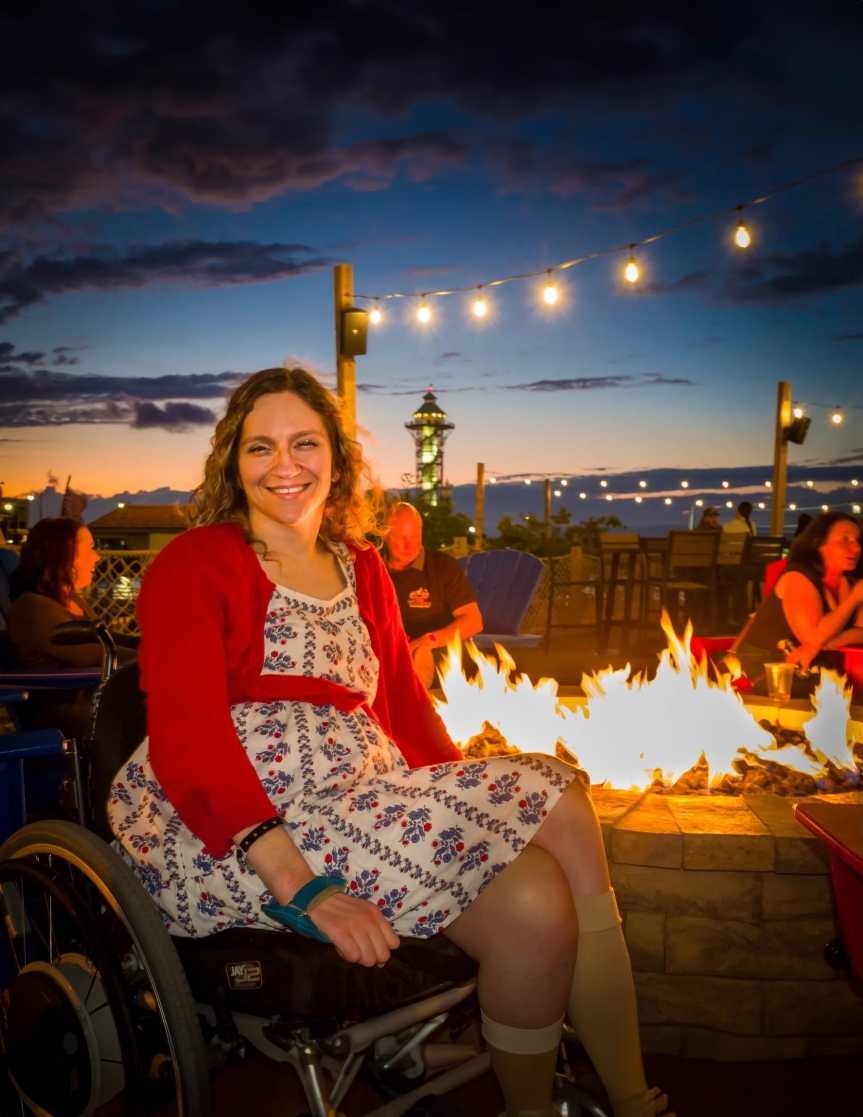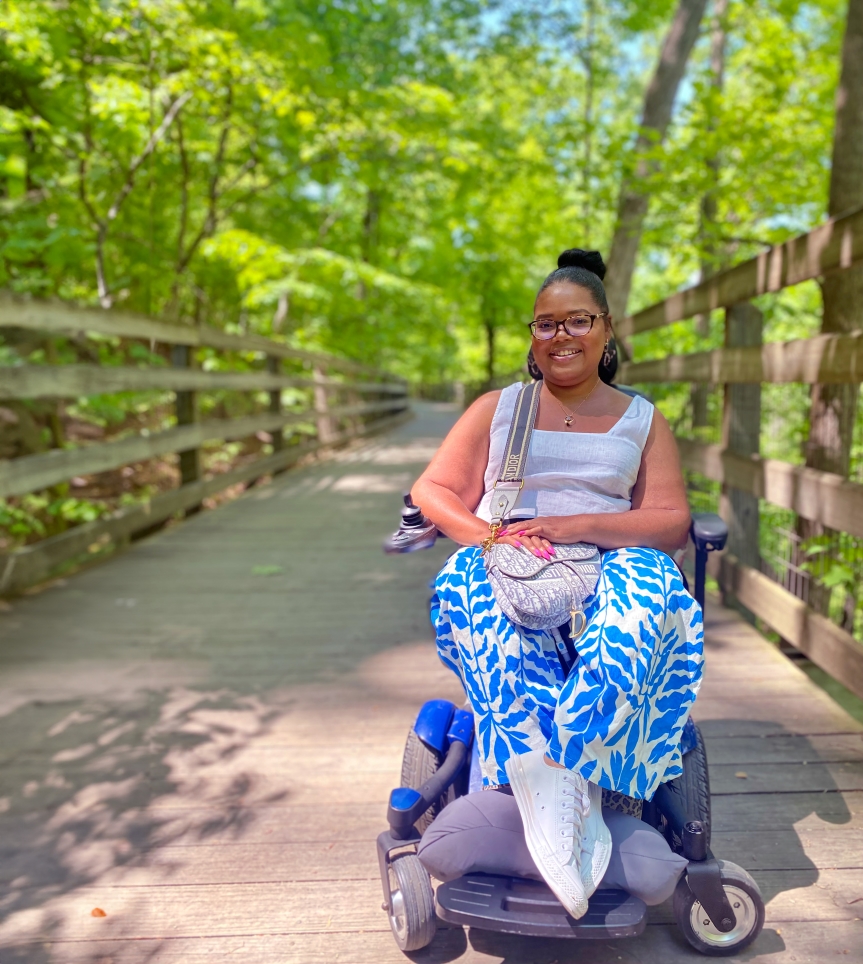The Quest for Accessible Travel
Advocate, educator, and blogger shares firsthand the challenges, triumphs, and transformative power of inclusive tourism experiences

The one thing that has been a constant in both the able-bodied stage and the disabled stage of my life is my love of travel. As an able-bodied child, I lived for my family trips to the Disney theme parks with my sisters. After a spinal cord injury in 1996 when I was 15 that left me with paralysis in all four limbs, I was hopeful that I would still be able to travel. But when I finally returned to Disney in 2004 now as a full-time wheelchair user I was disappointed to discover that I was not able to ride many of the rides I loved as a child. I had incorrectly assumed that “ADA friendly” or “ADA compliant” (see Americans with Disabilities Act at ada.gov) meant I would be able to fully access the park, when in fact some of my favorite rides could not accommodate my wheelchair. This early experience opened my eyes to the challenges people with disabilities face and began my journey as an advocate and educator for accessible travel.
My journey in accessible travel is just one of many. According to the Centers for Disease Control and Prevention, about one in four Americans – 27 percent of the population to be exact – currently identify as having a disability.
A “disability” is a diverse term that can be many things, including:
- Physical, cognitive, sensory, psychiatric, developmental, and learning
- Congenital or acquired, which can affect expectations of access
- Visible or nonapparent
- A group that anyone can join at any time, even for a temporary disability after an injury or surgery.
Prevalence rates have increased steadily over the past two decades due to the increased disclosure of disability status following progress in societal acceptance, new and updated laws protecting the rights of people with disabilities and the aging population. According to Jake Steinman, founder and CEO of TravelAbility, an organization working within the travel industry to improve the travel experience for people with disabilities and a resource for disabled travelers to find information to make their travel planning easier, “The sooner a destination is accessible for today’s travelers with a disability, the sooner they will also be ready for the 75 million baby boomers who are expected to age into a disability over the next 20 years and who will be seeking out destinations that cater to their needs.”
Like able-bodied travelers, disabled persons have a strong will/desire to travel and to do so independently. According to a 2022 report from MMGY Global, a company committed to promoting travel as a cultural bridge of understanding, travelers with mobility disabilities alone spend $58.2 billion per year on travel and take leisure trips at the same rates as travelers without disabilities.
Despite the many challenges they face, disabled persons want to experience the world like everyone else.
The Challenges

In the 27 years since my spinal cord injury, I have had many opportunities to travel both domestically and internationally. From the ancient ruins of Athens, Greece, to Arizona’s Antelope Canyon Tours, I have experienced successful and not-so-successful accessi.ble travel. I learned early that I needed to do my own extensive research on a destination to ensure my accessibility needs could be met. As you likely gathered from my earlier example, there was no guarantee that an attraction, hotel, or transportation would be accessible for me based on an attraction being labeled ADA compliant.
Through my experiences, I learned the important distinction between “ADA compliant” and “fully accessible.” An ADA-compliant business means it complies with the Americans with Disabilities Act, which was enacted in 1990 and amended in 2008, and meets the minimum legal requirements businesses must follow to ensure that they do not discriminate against people with disabilities (ada.gov/law-and-regs). A fully accessible business, on the other hand, typically goes beyond basic legal requirements and provides a more usable experience for people with disabilities. For me, this includes features such as automatic door openers, wider spaces, and lower hotel beds that allow me to easily transfer into from my wheelchair.
While understanding this difference and doing my research before traveling has improved my travel experiences, sometimes that is not enough. In 2022, MMGY Travel Intelligence (the marketing research and data division of MMGY Global focused on the hospitality, travel, and tourism industries) released a survey of about 2,300 Americans with disabilities who cited lodging and transportation as the biggest barriers. This certainly rings true for me, as some of my recent challenges have been because of broken chair lifts and elevators that prohibit me from accessing the attraction or vehicle, difficulties finding accessible ground transportation to get around at a destination, and discovering that the accessible hotel room that I had reserved well in advance was not the room that was ready for me.
Research and Resources
My accessible travels throughout the years have given me the experience I need to be an advocate and educator on accessible travel. When I speak at conferences, I share both my challenges and my hope to inspire positive change in the travel and tourism industry.
Reactions from the industry vary, ranging from ignorance about the ADA, to fear and nervousness about how to accommodate me, to a willingness to problem-solve and provide reasonable accommodations. According to TravelAbility’s Steinman, the travel and hospitality industry can “seem daunted by accessibility and has three mindsets: idealist, where accessibility is the right thing to do and accessibility is welcoming; fear, based on experience with litigation; and growth, as a growing opportunity.”
Fortunately, there are several resources available to help destinations improve not only their accessibility, but inclusion and sustainability as well. Founded in 2019, TravelAbility holds an annual summit that brings accessible travel experts together to educate travel and hospitality professionals on the growing market of accessible travel. The 2024 “Emerging Markets Summit” will be held in San Francisco Nov. 13-15, and will include panel discussions, workshops, and presentations on such topics as how to reach and engage travelers with disabilities and other emerging markets, how to leverage technology and innovation to enhance accessibility and inclusion, and how to be a good steward for your destination.ÊThe company’s website at travelability.net has a variety of helpful tools for the travel industry, including podcasts and blogs by experts, a search engine to find accessible destinations around the world, a calendar of disability and diversity events and holidays, a list of specialized travel providers, and more.
Wheel the World offers a networking site for travelers with disabilities where they can book accessible hotels and experiences, including group tours, at more than 250 locations around the world. At wheeltheworld.com, travelers can learn about the latest technological advances in accessible travel, read first-hand experiences and testimonials from travelers, and even see pictures and dimensions of accessible hotel rooms before they book. Founded in 2016 by Alvaro Silberstein and Camilo Navarro, Wheel the World also partners with members of the tourism industry, providing them with free listings of their accessible attractions, tours, and hotels and offering a comprehensive online educational/training course (for a fee) on how to offer the best inclusive service for guests with diverse disabilities and accessibility needs.
MMGY Global reports that 84 percent of travelers with disabilities would like destinations to provide more information on their accessibility prior to the traveler visiting, and 81 percent of travelers say that publicizing a destination’s accessible lodging options is especially important. Resources like Wheel the World, TravelAbility, and the travelers themselves can provide destinations with the research they need to both understand and add an accessibility page to their websites (this requires funding by their industry partners).
Success Stories

On a recent visit to the Green Bay Packers Hall of Fame, I was excited to see that its multimedia exhibits were at both able-bodied and wheelchair heights. One exhibit even had an interactive touchscreen menu that changed its format to accommodate a wheelchair user. This ABA member located in Green Bay, Wis., is one of many member destinations and attractions who are leading the way in accessible tourism. From the accessible shuttles, restrooms, entrance ramps, and knowledgeable staff at Monticello in Charlottesville, Va., to Belle Meade Historic Site’s alternative media guides that allow wheelchair users to explore areas of the historic home in Nashville, Tenn., that are not able to be made accessible, ABA members are working toward accessibility and inclusion so that everyone can enjoy a memorable and barrier-free experience.
“In Charlottesville and Albemarle County, we believe that travel should be accessible and enjoyable for everyone,” says Brantley Ussery, director of marketing and public relations for the Charlottesville Albemarle Convention & Visitors Bureau. “That’s why we have formed strategic partnerships and worked with local industry partners to ensure our destination is a more accessible and welcoming place for all visitors. Whether enjoying nature on the ADA-accessible Saunders-Monticello Trail, one of our more than 40 wineries, world-renowned historic sites, or the vibrant pedestrian Downtown Mall, we are excited to welcome everyone to enjoy the beauty of our region.”
Thinking Outside the Box
I often get my inspiration to travel to a destination through a blog written by an accessible travel blogger or a social media post the destination has posted. Blogs like Curb Free with Corey Lee and John Morris’s wheelchairtravel.org are two of my favorites. These are both great ways to promote your accessible offerings with little to no expense.
My husband and I started our own blog to highlight destinations close to our home in Cleveland. You can read about my visits to ABA members the National Comedy Center in Jamestown, N.Y.; Luray Caverns in Luray, Va.; Charlottesville, Va.; and more at The Squeaky Caster (squeakycaster.com).

Thanks to their partnership with the Erie Area Convention & Visitors Bureau in Erie, Pa., the National Comedy Center invited us to visit their museum and share our feedback. In my blog I describe the investment this interactive, technologically advanced museum has made in accessibility, including its wheelchair-height kiosk and a ramp leading to the open-microphone stage. In addition, the Comedy Center has used the photos from our visit to demonstrate how a wheelchair user can experience all it has to offer, which then allows other potential travelers to see how its destination can meet their needs.
I was thrilled to celebrate a milestone birthday at Luray Caverns, which realized its goal of creating a step-free entry to the caverns in 2019. An accessible ramp replaced the old entrance, and on my blog, I describe my first experience visiting an accessible cavern and share pictures as I easily maneuvered my power wheelchair along the 1.25-mile, moderate-grade, paved tour route through the breathtaking 146-year-old attraction.
“Achieving step-free access at Luray Caverns has been a decades-long goal for us, and we were delighted to see it come to fruition,” says Bill Huffman, director of marketing and public relations at Luray Caverns. “This new development not only preserves the historic integrity of the Entrance Building but also makes our world-renowned attraction more accessible to all visitors. We are proud to be one of the few underground wonders offering tours on fully paved, well-lit walkways with step-free entry, ensuring an inclusive experience for everyone.”
In addition to media outlets, a destination can also work with local disability groups (ex. their local chapter of the United Spinal Association) to be included in promotional materials demonstrating how a wheelchair user can enjoy their destination, attraction, or service. Or consider joining an accessible-travel community group on social media in which the disability community shares valuable informationÑboth positive and negativeÑabout their travel experiences from which you can learn and apply to your business.
Where Should You Start?
With the many different needs of travelers with disabilities, knowing where to start improving accessibility for your business can be challenging. Steinman recommends one of the best and easiest things tour operators and destinations can do is “send a questionnaire to your local attractions and hotels and add their accessibility information to your website.” Next, get to know your audience.
“The group travel industry is largely a senior market, and ABA members must be ready to create travel products for the incoming wave of aging baby boomers,” he says. “Most likely, their clients started traveling with a trusted tour operator when they were 60, but now they are aging into disability with conditions that affect mobility, sight, hearing, and even memory.”
In order to meet the needs of these aging clients who still want the social interaction and experiences a group tour offers, Steinman suggests that tour operators, destinations, and attractions go to the InnovateAble link on the TravelAbility website at travelability.net/summit/innovateable to learn about the new technologies that are available to enhance the visitor experience and even create what he calls “slowpoke itineraries,” or “chilled down” versions of regular tours.
People with disabilities have experienced discrimination, barriers, and exclusion in their travels; however, with every positive accessible travel experience a destination or attraction provides, more people with disabilities will be encouraged to plan future travel.
Angela Kuemmel, Ph.D., ABPP, is a rehabilitation psychologist and an accessible travel blogger who has also presented at professional conferences. She is academically published on accessible travel and lives in Cleveland with her husband, John, a professional photographer, and their beloved dog, Callie. Follow their adventures at squeakycaster.com.
JULY IS DISABILITY PRIDE MONTH
Commemorated every July to mark the anniversary of the passing of the landmark Americans with Disabilities Act, Disability Pride Month is an opportunity to honor the history and achievements of the disability community. This is a great time to celebrate accessibility in tourism by examining the accessibility your business currently offers and consider what other options you can provide. It is also a great opportunity to promote accessible tourism in your social media channels.
